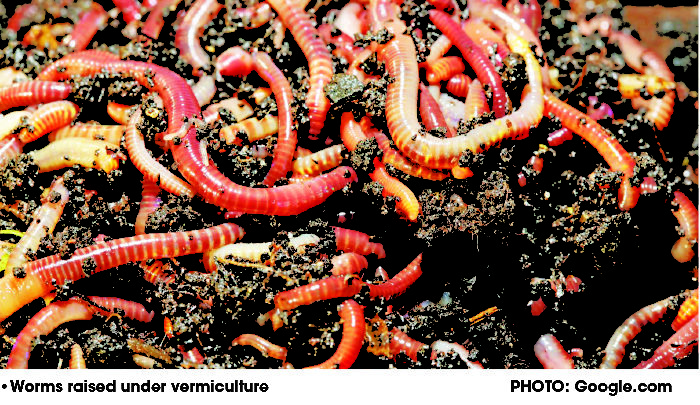
Vermiculture aiding healthier food production, fishing business
- Vermiculture is the use of specially bred earthworms to aerate the soil and convert organic matter into liquid compost organic fertiliser, also known as worm tea, and it can thrive in any part of the world wherever worms are foun
Farming is a multi-dimensional enterprise with several yet-to-be fully explored aspects, especially in Africa generally and Nigeria in particular. One of such aspects is worm farming, otherwise known as vermiculture or vermicompost. Vermiculture is big business in many developed countries but here in Africa, Nigeria in particular, the prospects of vermiculture have not been duly explored. There are, however, positive expectations for vermiculture as a business venture in the country owing to the growing need of its products.
Vermiculture is the use of specially bred earthworms to aerate the soil and convert organic matter into liquid compost organic fertiliser, also known as worm tea, and it can thrive in any part of the world wherever worms are found.
There is an increasing demand for protein-rich raw materials in fish and other animal feed industry. Earthworms have also been suggested as good substitute or feed supplement for fishmeal in aquaculture. Earthworms, today, are being considered globally in the degradation of waste and as an alternative to inorganic fertilisers.
The earthworms are generally used as bait by fishermen. However, large-scale vermiculture has the potential of supplying earthworm meal as a substitute of fishmeal. The earthworm meal contains all the essential amino acids required in fish feed.
There are different species of earthworm but the most common among breeders are the eisenia fetida that has wide range of temperature tolerance, high reproductive potential and is less sensitive to density pressure; and the eudrtilus eugeniae, commonly called ‘African nightcrawler’ and is also an efficient earthworm to maintain as culture.
The nutrient-rich benefits of vermicompost that promotes faster growth of plants, increases crop yield with less irrigation, reduces soil erosion, lessens wasteland formation, is chemical-free and produces better crops.
Benefits of vermiculture:
Vermiculture, also known as worm management, improves organic fertiliser. It is an easy process that breaks down organic materials and produces castings that enhance plants’ growth by providing trace elements, enzymes, and nutrients to the soil.
Saves money: Using vermiculture to naturally fertilise plants can save money, which would have gone into buying fertilisers, soil conditioners, and insecticides necessary for farms to maintain their health. Profits can even be generated by selling both the worms and castings produced to farmers, fishermen, nurseries and pet shops.
Helps protect plants from disease: The “compost tea”, one of the most potent liquid fertilisers, created from vermicomposting helps to combat common diseases in plants such as tomato blight and grape and squash mildew. This compost matter is beneficial to the health of vegetables, fruits, and trees, and enhances all round growth. It can also act as a natural fungicide and insecticide and will never burn plants. One can start a liquid fertiliser business in Nigeria with it.
An odourless process: Vermiculture is an odourless process, which allows it to be done indoors unlike traditional composting. Worm bins are simple to maintain and use.
Reduces household waste: Vermiculture cuts down on household waste. The redworms used in vermiculture continue to reproduce as long as there is food waste for them to consume. Once the food runs out, the worms will begin to die. To maintain a successful worm bin, household vegetable food scraps must constantly be added to the bins to keep the worms alive and thereby cut down on the amount of waste thrown out at home.
Non-hazardous process: Vermiculture is an organic process that cuts out the need to be concerned about the risks associated with traditional pesticides and fertilisers. The toxins such as benzene and xylene contained in some pesticides and fertilisers can cause serious damage to human organs and the nervous system. With vermiculture, there is no need to be concerned with any risks associated with these chemicals because it is all natural.
Creates healthier food products: Products grown with vermicomposting grow larger, and in some cases even taste better. In commercial settings, using this process to fertilise plants naturally yields products that attract higher prices due to their better quality.
Vermiculture is an easy way to create a compost that is an excellent source of nutrients for the garden or farm. It can be done in a small space and with no odour, and is a great project that can be done indoors all year round and cuts out the need for a traditional compost pile. Earthworms secrete a substance called slime that’s very rich in nitrogen which is basically plant food.
Environmental benefits: Worms dig the earth and the channels and burrows they dig help with water drainage after heavy rains, thus reducing soil erosion significantly.
Vermiculture process: Despite its economic potential and other benefits, it is advisable to start vermiculture on a small scale as this will enable one decide if this is something to pursue on a more serious scale. An enthusiastic worm grower could maintain a stock of 50-100 pounds of worms in in an apartment etc.
Starting off: Vermiculture cannot be practiced without worms, hence there is need for red wigglers, red worms, manure worms, brandling, etc. These species thrive on food waste and similar organic stuff and they’re easy to find in compost heaps, aged manure or even piles of leaves. Between 500 and 2000 red wigglers will be required to start. They will thrive and multiply if provided with the right environment, as their population doubles every three months or thereabout.
Compost bin: This is a plastic container filled with red worms and a special moisturised bedding in which they thrive and prosper. The bedding can also be created using leaves and shredded newspaper. Add the worms into the mix of food and organic waste into the compost bin and the worms begin to reproduce and multiply as they eat. A plastic, metal or wooden container can also be used or any already available container. Anything will do as long as it comes with a tight lid.
The container must have a bottom catch tray, drainage holes and air vents on the sides and top. Worms thrive in moisture and dark environments, so the container should be covered to trap moisture inside and keep light and rain out. Keep the bin protected from extreme temperatures, i.e. freezing, heavy rain, hot sun, etc. Two to three handfuls of sand can be added among the bedding to provide them with grit for the sake of the worms’ digestion.
The worms thrive on fruit peels, grains, breads, vegetable scraps, coffee grounds/filters, tea bags and crushed egg shells. Forbidden scraps worms totally hate are oily/greasy foods, fish, meat, butter, cheese and animal wastes.
Harvesting: A successful harvest, i.e. worm castings, requires 12 to 16 weeks. At the end of that time, the worm population will have eaten and digested all the bedding and the garbage in the container or bin, which will then be filled with black, natural, organic soil fertiliser. To harvest the compost, separate the worms from the compost and send them to another “job”. Fill up one side of the container with a fresh new bedding (filled with worm food). The worms will migrate to the other side and the remaining “worm free” compost can be removed for use in the garden or farm.
A kilo of earthworm is sold for as much as $40 and in Nigeria, as much as N500,000 can be generated monthly from farming worms within a plot of land with the right marketing strategies. There are some ways to reach out to customers fairly quickly. It is important to create a basic website, which can generate business and additional promotion. Online classified advert sites can also be useful in this regard. Ensure the advert is as descriptive as possible, with image(s) (if allowed), as this will help increase the chances of someone finding and looking at the posting. Putting up flyers in your area, especially in grocery stores and other establishments, can equally be helpful in getting customers. Some of these places have bulletin boards for this purpose.
With additional materials from Worm Farming Alliance & Survivopedia.



